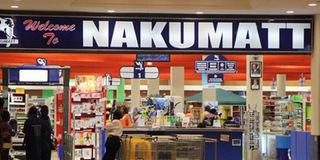Prime
How much trouble is Nakumatt’s Uganda operation in? Here’s hope

Nakumatt Supermarket
In Uganda, where lines of empty shelves are the order of the day, the Nakumatt Supermarket Empire seems to be going through very testing times.
Nakumatt has its fair share of critics, and has made many missteps, but it has also been a very clever business, and as a devotee of the start-up culture, I admire that.
It’s only the non-airline business in East Africa that has made the loyalty card work. With it has been able to learn the behaviour of consumers in East Africa like few others.
Its relatively new international card has been a boon for start-up entrepreneurs. The downside with credit and debit cards is also their advantage.
If you have a limit of $20,000 and someone hits you, they can clean it all out. With your debit card, if it is hacked, the cyber criminals will not just rob you, but also get access to the vast range of your financial information.
There is little risk if your Nakumatt card is hacked, and you can top it with $50 if you want to make an online purchase for exactly that amount a short while later. For buying software, coupling to PayPal, inexpensive subscriptions, and such things, the introduction of the card looked like a stroke of genius.
So why do companies like Nakumatt still stumble? Beyond the business decisions its management will have made, in common businesses fail and struggle because they are not able to understand how the societies they operate in have changed.
Take an example of media, which I understand quite well. In recent years, you will have read or seen stories about layoffs and difficult economic times in Kenyan media, a bigger advertising market than all the other East African countries combined.
People blame the “death of a reading culture”, greedy owners, and especially the rise of digital media for the problems newspapers are facing.
But this can only be part of the story. Some economists claim, controversially, that in the years of former president Mwai Kibaki’s rule (2003-2013), Kenya witnessed its biggest infrastructure expansion, with more money spent in those 10 years in real terms than the previous post-independence 38 years.
In any event, the big investment in roads dramatically changed the make-up of Nairobi and surrounding areas, with new suburbs and housing being built dozens of kilometres out, and a string of overhead traffic bridges and freeways.
The middle class began to move to live further out. In addition, office complexes were also built far out of town, so assume Naalya was three times further out, many of the people who live there would be working in offices nearby, and never have to come anywhere near central Kampala. With overhead bridges and highways where vendors couldn’t sell newspapers, the old distribution system started to fall apart and sales to suffer.
It’s easy and tempting to blame media managers and editors, and even “unserious” readers, but something counter-intuitive happened. The reason newspapers are suffering is because good things took place – urban infrastructure and the middle class grew! It’s just not “normal” to plan to see good things as a potential problem, so we get caught out.
Now take Kampala: It has since grown from seven hills, to over 20.
Its roads have become gridlocked with traffic, and boda bodas have made driving a nightmare.
Few people living in Naalya, will endure traffic and drive on a Saturday to shop in Nakumatt at Oasis mall, therefore, it was right for Nakumatt to set up an outlet in Naalya. Its mistake was to see Naalya as a linear suburb.
Apart from the old suburbs (Kololo, Nakasero, Bugolobi), Kampala’s expansion is not planned.
Therefore, rich middle class homes exist alongside villages. You drive by a Sh500,000 muddle and wattle house to go to visit a friend who has a Shs500 million mansion opposite it.
The rise of new suburbs in Kampala, don’t necessarily mean the growth of a market. Instead of a large supermarket, something the size of the mini-markets attached to petrol stations might have been enough, who knows?
But then Nakumatt is not into running grocery shops, it is into supermarkets. In Uganda, they have become like the woman who married the wrong man – or vice versa.
In places like South Africa, there are solutions to these things…think tanks and specialist organisations that study such trends.
Uganda is ripe for one. Not the type of think tanks that study what will happen to Uganda if the South Sudan conflict continues for five years, but what kind of consumer market shall come to be when Entebbe and Kampala become one, and Entebbe Road turns into nothing more than the longest street in Uganda.
Perhaps its time for Nakumatt and others in that business, out of self-interest, to benefit such a think tank at Makerere University.
Onyango-Obbo is the publisher of Africa data visualiser Africapedia.com and explainer site Roguechiefs.com. Twitter@cobbo3




